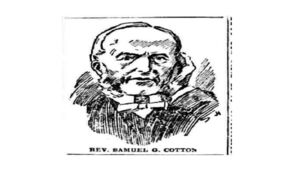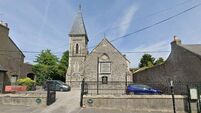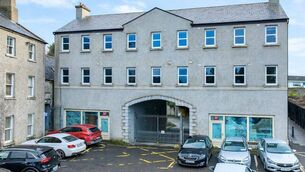The strange case of the criminal Kildare cleric

Rev Samuel Cotton
SAMUEL George Cotton was born at 2 St George’s Place, Bray in 1823. His father was a well-known Dublin surgeon. Cotton was educated privately and attended Trinity College Divinity School, before being ordained a deacon in Christ Church Cathedral, Dublin in August 1847.
He was appointed curate to the Athy parish and was first noted as reading at St Michael’s Church on 29 September 1847, when he read to a congregation of 270 in the morning and preached to 70 parishioners in the evening. The Preachers Book for St Michael’s shows his final homily for the Athy parishioners was delivered on the evening of 2 July 1848. Two weeks earlier, he was ordained a vicar in Tuam Cathedral and shortly thereafter was appointed Vicar of Kilberry Parish in succession to Rev William Warburton.
Rev Cotton’s early years in Kilberry were uncontroversial, even if his opinions of parishioners and Kilberry natives alike, which he wrote in his Visiting Book in 1853, painted a character likely to fall foul of third parties.
He visited his Kilberry parishioners in their homes during a period of four months starting in April 1853, making notes on individual parishioners. These notes were generally critical of his parishioners, one of whom he described as ‘a great humbug of note, if anything a Romanist’. Another was described as ‘a great drunkard, never been to church nor seen at communion’.
It was interesting to note the number of parishioners whom he described as former Roman Catholics.
It was not long before the Rev Cotton fell out with many of his parishioners, which resulted in the following letter issuing on behalf of his dissatisfied parishioners to the archbishop of Dublin.
There were further complaints in the letter which was signed by AG Judge and George J Phipps, as well as ten church wardens. The letter was supported by Lord Downes of Bert House, who wrote to the archbishop on 7 April 1855 claiming that the conduct of the Rev SG Cotton had for some time past been of an extraordinary nature and that many of his parishioners had ceased to attend his church.
The archbishop is not recorded as having dealt with the parishioners’ complaints and what was described in the as ‘The Church and the Kilberry controversy’ continued into the following year, with many letters from Rev Cotton featuring in the newspaper.
In March 1857, Rev Cotton found himself before the magistrates at Athy Petty Sessions charged with assault and facing a civil claim for wages due to the former sexton of Kilberry Church. The magistrates found in favour of the plaintiff and awarded a decree for nine shillings and ten pence, including costs, against Rev Cotton.
The evidence in relation to the assault charge concerned the former sexton, a female, who satisfied the court that Rev Cotton pulled a chair from under her and attempted to pull her out of the local school.
The vicar received the first of many convictions that he would receive during his clerical career, with a fine of one pound and two shillings and sixpence costs.
Rev Cotton then went to war against the , which reported the petty sessions hearing claiming that the newspaper was biased in its reporting. Many letters from the cleric were dealt with by the editor who, on one occasion, wrote: ‘Mr Cotton appears to think we entertain an unkind disposition towards him and that we have used language calculated to do him injury. We must disclaim any such feeling … while we have every right to express our dissent from his views’.
The Rev Vicar’s letters continued and were published in the .
The editor was then moved to write: ‘It is a matter of much regret to us that our columns should be so frequently occupied with this Rev gentleman’s affairs, and it is with difficulty that we can maintain the proper bounds of newspaper discussion. In our last edition, Mr Lefroy, an old and respected magistrate, was accused by Mr Cotton of bias in the discharge of his duties and has deemed it necessary to repel in indignant terms the imputation.’
Rev Cotton also fell out with Rev FS Trench, rector of Athy, whom he had called upon to intervene in the row between the Kilberry parishioners and himself. Rev Trench apparently did not intervene and subsequently was the subject of a letter of complaint from his Kilberry counterpart.
A further complaint from Messrs Judge and Phipps that monies collected for the local church were misused by Rev Cotton was the subject of an enquiry by two former church wardens. They were satisfied that all monies collected since 1847 had been distributed in the same way as Rev Cotton’s predecessor, Rev Warburton.





